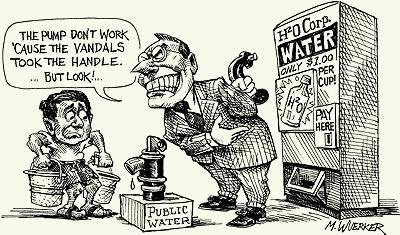In an effort to subvert the current Housing Crisis the Bush Administration is planning a bail out of home owners whose mortgage balances are greater than the value of their homes. Details are sketchy, but essentially the bank would reduce the principle balance of the mortgage, so that the home owner would no longer be in a negative equity situation.
It's unclear at this point whether this deal would extend to those who are negative as a result of using home equity to live the american dream, which for many has become a personal nightmare. It's also unclear whether only sub-prime mortgages will be targeted, or whether the bail out will extend to home owners who are negative as a result of short-sales and foreclosures in their neighborhoods.

One thing is clear, a consumer bail out of this magnitude is unprecedented, and we'll all be eager to see what happens.
It's unclear at this point whether this deal would extend to those who are negative as a result of using home equity to live the american dream, which for many has become a personal nightmare. It's also unclear whether only sub-prime mortgages will be targeted, or whether the bail out will extend to home owners who are negative as a result of short-sales and foreclosures in their neighborhoods.

One thing is clear, a consumer bail out of this magnitude is unprecedented, and we'll all be eager to see what happens.
Read the article here.



 Well, at present, the only way to access a home via the lockbox is through the use of a broker or agent... but imagine a system that would allow you to register for an access card that would allow you to view a home on your own. A system where you would use the internet to schedule an appointment (with the seller) to view the home. This way, the seller always knows who's coming and when. The only thing left to do is negotiate a price and sign the contracts... Well, the negotiating can also be done over the internet, and the contracts could be signed using a third party.
Well, at present, the only way to access a home via the lockbox is through the use of a broker or agent... but imagine a system that would allow you to register for an access card that would allow you to view a home on your own. A system where you would use the internet to schedule an appointment (with the seller) to view the home. This way, the seller always knows who's coming and when. The only thing left to do is negotiate a price and sign the contracts... Well, the negotiating can also be done over the internet, and the contracts could be signed using a third party.








